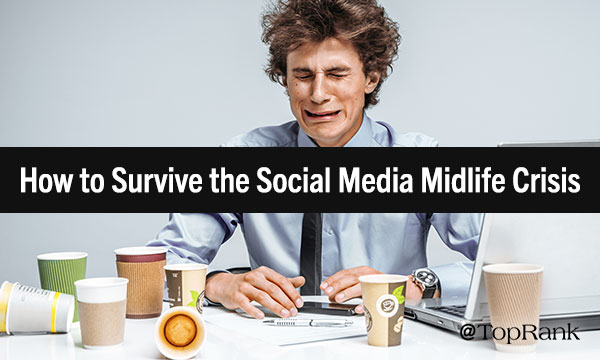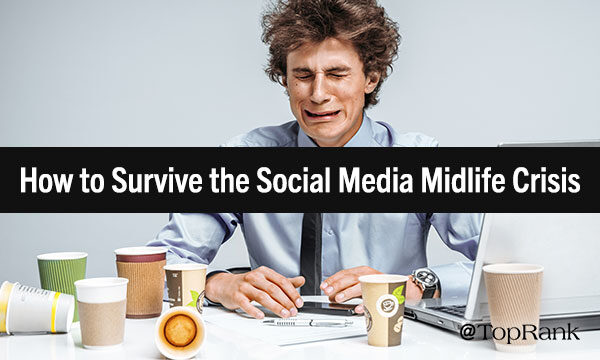
Time moves faster on the internet. Last month’s memes are about as relevant as a 1920s vaudeville show. Even a bona fide viral phenomenon from just a few years ago seems quaint and dated.
Twitter and Facebook are only 12 and 14 years old, respectively. But they’re aging at internet speed. And right now they’re having a midlife crisis. Instead of buying a sports car and taking up craft brewing, though, that crisis is manifesting as existential dread and intense soul-searching.
The people who run the platforms are publicly examining their purpose and societal impact. More importantly, the people who use the platforms are asking tough questions:
What am I getting out of my time spent here?
Who is this platform structured to benefit?
Should I be trusting my data with this platform?
Is this a positive or negative thing I have let into my life?
As marketers, we have to ask ourselves the same questions. And we should add one more: Is our social media marketing valuable to our audience?
If we’re not adding value, we’re adding to the problem.
Social media is in crisis right now. But that doesn’t mean marketers should abandon ship. It means we have to do our own soul-searching. We need to take our social media accounts off of autopilot and approach them mindfully. Here’s what marketers should consider as we weather the social media midlife crisis.
How Does Your Social Media Marketing Make People Feel?
A recent Hill Holliday report found that a majority of 18-24 year olds were at least considering abandoning social media. Over a quarter said that social media hurts their self-esteem or makes them feel insecure. Thirty-five percent said there was too much negativity, and 17% said they were considering quitting because social media makes them feel bad about themselves.
Connecting with your brand on social media should make a person feel better. They should feel that your brand shares values with them, is paying attention to them, can help meet needs and solve problems.
It’s worth evaluating what your brand is posting on social to make sure it’s helping spread positivity. The old days of scaring or shaming people into buying a product are more than over. The overarching message of any brand on social media should be some variant of: “This is what we’re like. If you’re like that too, you’re awesome. Here’s some help you didn’t even know you needed. Here’s something to make your day a little brighter.”
Connecting with your brand on #socialmedia should make a person feel better. They should feel that your brand shares values with them, is paying attention to them, can help meet needs & solve problems. - @NiteWrites Click To TweetIs Your Brand Using Social Media to Be…Well…Social?
Let’s be honest with ourselves, shall we? No one opens their Facebook app saying: “Gosh, I hope I have some satisfactory brand interactions today.” People use social media to connect with other people — you want to see if your high school best friend had her baby, check out your uncle’s kitchen remodel, or see pictures of your parents’ second honeymoon.
Most brands on social media have been pretty lousy at giving people that type of person-to-person interaction. Which explains why people are moving their conversations out of the public eye, into private groups in apps like Facebook Messenger and WhatsApp.
How can brands be more social on social media? It starts with transparency and honesty. I love Wendy’s’ sassy Twitter account as much as the next jaded Gen X’er, but snark only takes you so far. Use your social media posts to introduce the people behind your brand and the values they stand for. Then aim for meaningful interaction: When someone reaches out to the brand, make sure the reply is prompt, personal, and useful.
How can brands be more social on #socialmedia? It starts with transparency & honesty. - @NiteWrites Click To TweetIs Your Brand Connecting with People Your Audience Trusts?
At the heart of it, there’s a limit to how well your brand can connect with individual people. Even when you’re honest, transparent, and engaging, a brand is still not a human being. The relationship dynamic will always be a little strained.
That’s one of the many reasons why influencer marketing works so well. Influencers can co-create content with you and amplify it to their audience on a much more personal basis than your brand could manage on its own. Find the people your audience already follows — in other words, the ones they want to interact with. Then work with these influencers to bring their audience great content that only your brand could have helped create.
Working with influencers helps put the personal, social touch back into social media marketing. It puts the emphasis of your brand interaction where it belongs: person to person.
Working with influencers helps put the personal, social touch back into #SocialMediaMarketing. - @NiteWrites Click To TweetRead: Death of Facebook Organic Reach = Opportunities for Influencer Marketing
Getting Beyond the Crisis
When social media platforms first launched, most of us jumped right in. We found our high school classmates. We connected with friends from college. We added co-workers and family members and friends of friends, and we shared everything. Over time, we developed routines. Now, people are finally starting to analyze just what social media means to them. Most will keep their accounts open — but the majority will change the way they interact with the platforms.
Sound familiar? Most brands jumped headfirst into social media, developed routines, and then many of us went on autopilot. Now it’s time to question what we hope to get out of social media, and whether our tactics are getting us closer to those goals. And most importantly, making sure our goals match what our audience wants from us.
Need help with social media marketing? We have you covered.



